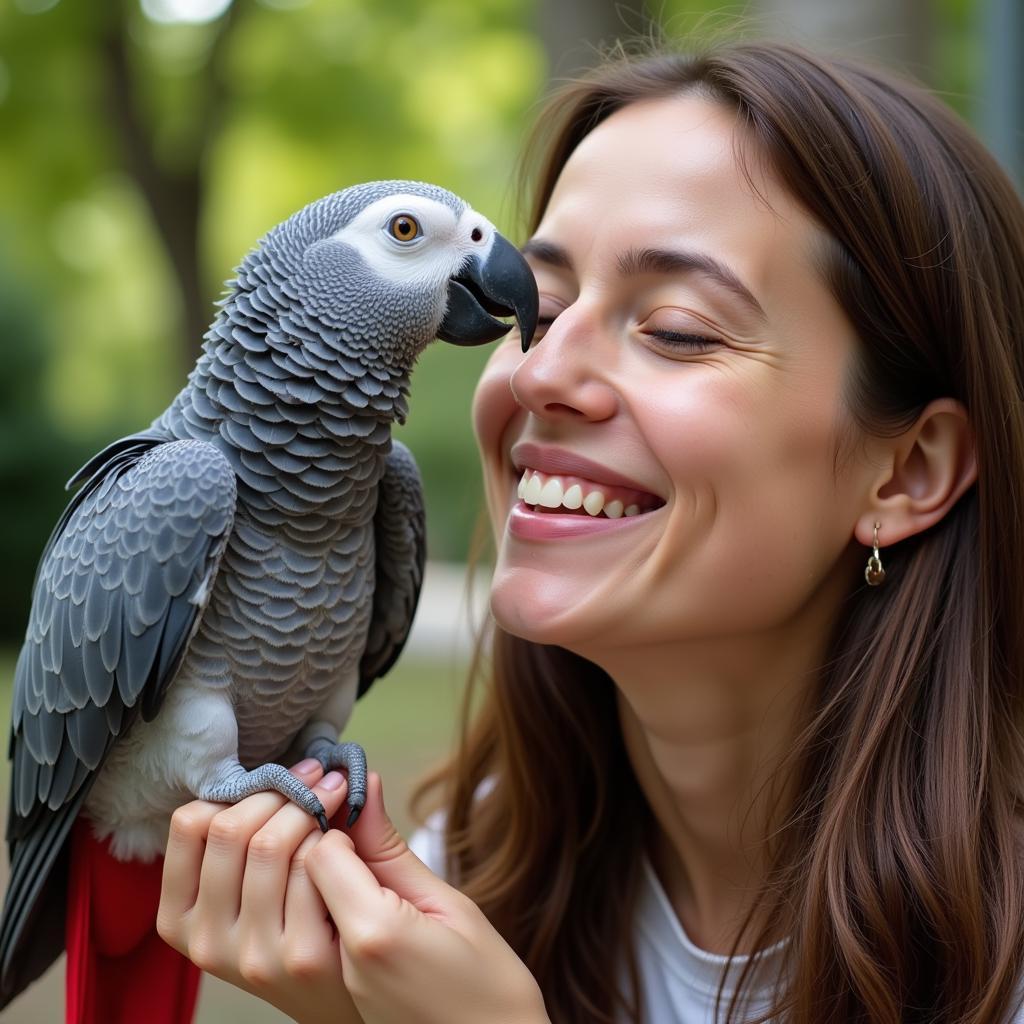Demystifying African Gray Sounds: A Guide to Their Vocalizations
The African Gray parrot, a majestic creature native to the rainforests of West and Central Africa, is renowned for its exceptional intelligence and uncanny ability to mimic human speech. However, beyond their impressive vocabulary lies a fascinating world of African Gray Sounds that form a complex language all their own. These vocalizations, ranging from soft chirps to ear-piercing screams, provide valuable insight into their emotional state, needs, and social interactions.
 African Gray Parrot Vocalizing
African Gray Parrot Vocalizing
Deciphering the Language of African Gray Sounds
Understanding the diverse repertoire of African gray sounds is key to building a strong and fulfilling relationship with these intelligent birds. Just like humans, they use their voice to communicate a wide range of emotions, from contentment and excitement to fear and aggression.
Common African Gray Sounds and Their Meanings
- Chirps and Whistles: Soft, melodic chirps and whistles are often signs of a happy and content parrot. They may use these sounds to greet their owners, express curiosity, or simply to entertain themselves.
- Trills and Warbles: These more complex vocalizations often indicate a playful mood. Your African Gray might trill or warble while playing with toys, preening its feathers, or interacting with you.
- Screeches and Shrieks: While these loud, harsh sounds can be startling, they are not always a cause for alarm. African Grays may screech or shriek to get your attention, express excitement, or as a territorial display. However, prolonged or excessive screaming can be a sign of stress, boredom, or illness and should be addressed.
- Growls and Hisses: These sounds are clear warning signals and should not be ignored. An African Gray that growls or hisses is feeling threatened or agitated and may bite if approached.
- Mumbling and Talking: African Grays are famous for their ability to mimic human speech. While not all African Grays will learn to talk, those that do may mumble to themselves, repeat words and phrases they’ve heard, or even engage in simple conversations.
 African Gray Parrot Interacting with Owner
African Gray Parrot Interacting with Owner
Factors Influencing African Gray Vocalizations
Several factors can influence the type and frequency of African gray sounds, including:
- Age: Young African Grays tend to be more vocal as they explore their voices and learn to communicate.
- Environment: A stimulating environment with plenty of toys, perches, and opportunities for interaction will encourage a wider range of vocalizations.
- Health: Changes in vocalization can sometimes be a sign of illness. If you notice any sudden or drastic changes in your parrot’s voice, consult an avian veterinarian.
- Emotional State: Just like humans, African Grays use their voices to express their emotions. By paying close attention to their body language and vocal cues, you can learn to understand what your parrot is trying to tell you.
The Importance of Vocal Enrichment
Providing your African Gray with adequate vocal enrichment is essential for its overall well-being. This can include:
- Talking to your parrot regularly: Even if your parrot doesn’t learn to speak, it will benefit from hearing your voice and the sounds of human conversation.
- Playing music and nature sounds: African Grays enjoy listening to a variety of sounds.
- Providing toys that encourage vocalization: Toys that make noise, such as bells, rattles, and musical instruments, can stimulate your parrot’s vocal cords.
 African Gray Parrot Playing with Toy
African Gray Parrot Playing with Toy
By understanding the nuances of African gray sounds, you can unlock a deeper understanding of your feathered companion and foster a more enriching and rewarding relationship.
FAQs about African Gray Sounds
Q: Why does my African Gray parrot mimic me?
A: African Grays are highly social creatures and mimicking is a natural part of their communication. They may mimic your voice to get your attention, show affection, or simply to join in the conversation.
Q: How can I encourage my African Gray to talk?
A: Patience and positive reinforcement are key. Start with simple words and phrases, and reward your parrot with treats and praise for any attempts at vocalization.
Q: What does it mean if my African Gray is constantly screaming?
A: Excessive screaming can be a sign of stress, boredom, or illness. It’s important to rule out any underlying medical conditions and to provide your parrot with plenty of mental and physical stimulation.
Q: Do African Grays understand the words they are saying?
A: While African Grays are highly intelligent and can learn to associate words with objects and actions, the extent to which they understand the meaning of human language is still debated among experts.
Q: Can African Grays learn to sing songs?
A: Yes, African Grays can learn to sing songs with practice and patience. You can teach them by singing or playing songs frequently.
For those interested in exploring the fascinating world of African parrots further, you can read more about the African chat bird or the African cockatiel parrot. Additionally, learn about the differences and similarities between the African Gray and Red Crowned Amazon parrots.
Conclusion
Understanding the intricacies of African gray sounds is a journey that deepens the bond between bird and owner. By recognizing the nuances of their vocalizations, we open a window into their emotional world, fostering a relationship built on communication, respect, and love. As we continue to learn from these intelligent creatures, we gain a greater appreciation for the beauty and complexity of the natural world.
If you have any concerns about your African Gray’s health or behavior, consult with a qualified avian veterinarian. Remember, providing a loving and stimulating environment will encourage your parrot to thrive and share its unique voice with the world.
Need help? Our customer support team is available 24/7. Please contact us at +255768904061, email us at kaka.mag@gmail.com or visit us in Mbarali DC Mawindi, Kangaga, Tanzania.
